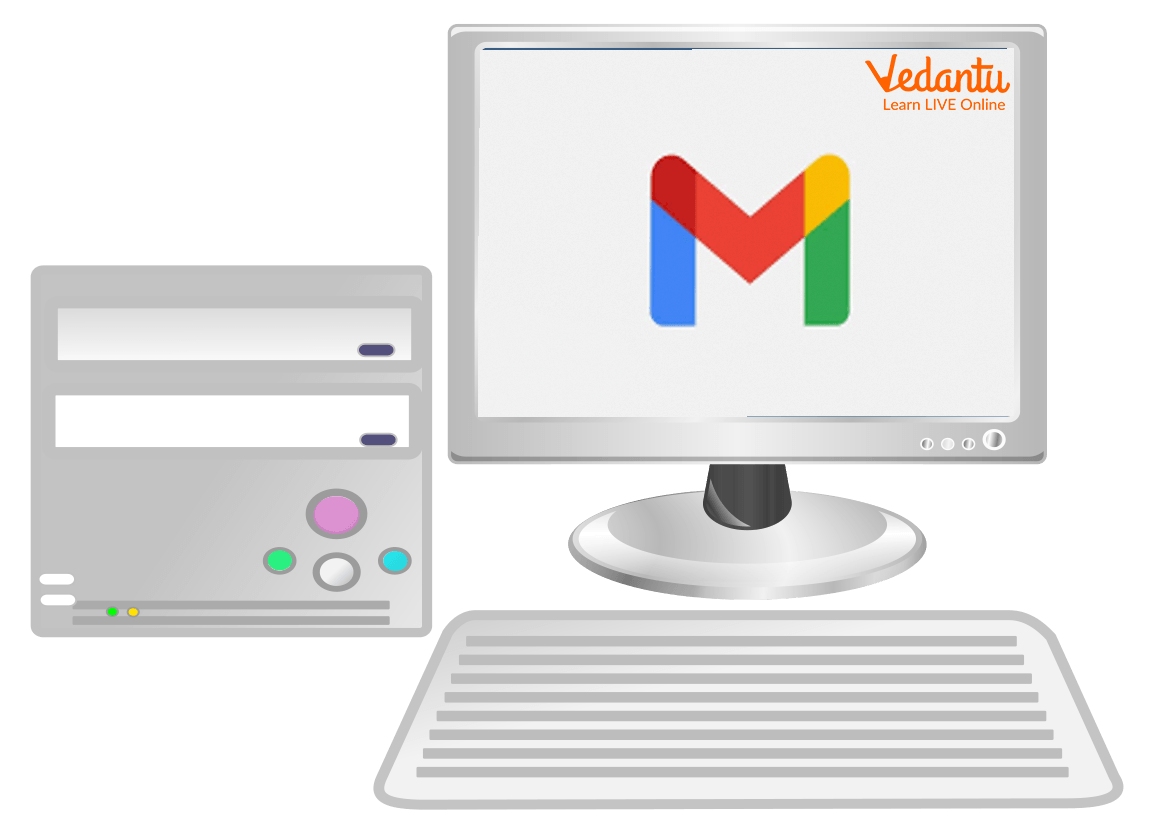




Introduction to the Internet
The Internet connects computers all around the world through a vast global network. It makes it possible for data to be transferred among two or more computers linked via a network. As a result, the internet makes it easier to send communications via chat, audio, video conferencing, etc.
It is a helpful tool for understanding and exploring a range of subjects. Through the internet, we may interact with people who are located in other countries. We have provided advantages and disadvantages of the Internet for students to completely understand the concept easily.
What are the Advantages of The Internet?
Sending Email

Email on The Internet.
Email allows us to send and receive messages from anybody with an Internet connection.
Finding Information

Searching For Information on The Internet.
The internet has information available on practically every subject. It is a useful tool for researching and communicating about various kinds of topics.
Making Online Payments, Finance, and Banking

Payments, Finance, and Banking on The Internet.
You may monitor your bank account's balance, perform transactions, and transfer funds via the Internet. Additionally, a lot of providers let you check and pay bills online.
Communication

Communication on the Internet.
Chatting is a feature that allows Internet users to connect from any location around the globe. Despite the physical separation, it seems as though you are conversing with the other person.
Online Shopping

Online Shopping on The Internet.
You may now shop without leaving your home because of online retailers. Through the Internet, you may order a product that will be supplied to your home.
Entertainment

Entertainment on The Internet.
You may enjoy viewing movies and listening to music on the internet, which offers a huge selection of both.
Playing Games

Online Gaming on The Internet.
There is a huge selection of games available on the internet that you may play independently or with fellow Internet users.
Places Where The Internet is Used
Schools And Colleges
The Internet in schools and colleges is very useful as teachers and professors can use the internet for educational and learning purposes. It helps students to learn and search for new technologies, tools, and methods.
In Offices
The Internet is very essential for various office tasks like sending emails, forwarding documents, data processing, video-conferencing, searching for information, etc.
In Banks
The Internet in banks is useful for providing benefits of online payments and other online financial services to the customers. Customer services like problem redressal are also provided by banks using the Internet.
Household
Internet connection is very useful for different personal tasks like sending emails, making online payments, watching movies, and playing music, making video calls.
Shops
The Internet plays a very important role in shops and retail markets, as it helps to sell and make online orders.
Disadvantages of the Internet
While the Internet has revolutionised our lives and proven to be a remarkable invention, it also comes with several drawbacks that can affect individuals and society:
Cybersecurity Risks: One major disadvantage of the Internet is its vulnerability to cyberattacks. Websites, apps, emails, and software are all prone to security breaches. Hackers can exploit system vulnerabilities to steal sensitive information, making online data vulnerable to theft.
Reduced Social Interaction: Despite the Internet facilitating virtual communities via social networks, it has also led to a decline in real-world social interactions. People now find it more difficult to form strong, meaningful human connections, unlike in the past when face-to-face socialisation was more prevalent.
Identity Theft: Cybercriminals often steal personal information and credentials for fraudulent activities. Unauthorised access to personal details, such as social security numbers or bank account info, can lead to identity theft. This can cause significant harm, including financial loss and damage to one's reputation.
Addiction: Internet addiction has become a growing concern, particularly among teenagers who spend excessive amounts of time on social media, gaming, or browsing. This overuse can lead to prioritising online experiences over real-life interactions and may result in aggression, depression, and a decline in mental well-being when internet access is limited.
Diminished Attention Span: The constant availability of entertainment on the internet has contributed to a shorter attention span. People today struggle to focus on tasks for extended periods, as they are constantly distracted by the fast-paced content online.
Blurred Line Between Reality and Fiction: The rise of virtual reality (VR) devices may further blur the distinction between real and fictional worlds. As VR technology advances, people may become so immersed in these simulated experiences that it becomes challenging to distinguish between fiction and reality, impacting their ability to engage with the real world effectively.
Spread of Misinformation: The internet is flooded with vast amounts of information, but not all of it is reliable. Without a regulatory body to verify facts, it is easy to encounter fake news, misinformation, or clickbait content, which can mislead users and spread false narratives.
Summary
The term "internet" refers to a collection of different services and information.
It is a useful tool for researching and communicating about various kinds of topics.
We can communicate with individuals sitting in distant regions via the internet.
The Internet enables information transfer between two or more computers connected by a network
The internet provides a means of enjoyment in addition to serving as a source of information and communication.
Solved Questions
1. What are the disadvantages of the Internet?
Ans: Disadvantages of the Internet are as follows:
The biggest drawback of the internet is hacking.
Cyber attackers have a lot of access to personal data on social media.
Internet virus risks can harm information and personal data.
Excessive internet addiction causes time to waste, which harms our well-being and productivity.
Kids should only use the internet when supervised by an adult.
Online gaming addiction hurts health, causing obesity and other major health problems.
Phishing has been the practice of obtaining sensitive and personal information while posing as a reliable source.
Students that engage in excessive gaming and web browsing are distracted by the internet.
A lot of audio and video content is inappropriate for particular age groups.
2. Describe the uses of the Internet?
Ans: Uses of the Internet are as follows:-
Send and receive Emails.
Finding information.
Making online Payments.
Communicating with others.
Online shopping.
Entertainment.
Playing games.
Learning by Doing
Choose the correct:
1. Which of the following is not a use of the Internet?
Send emails.
Physical Shopping.
Making payments.
2. It is referred to as _____ when individuals utilise the Internet to connect with others anywhere on the globe.
Online browsing.
Online browsing.
Online gaming.
FAQs on Advantages and Disadvantages of the Internet
1. What are the primary advantages of using the Internet?
The Internet offers numerous advantages that have transformed modern life. Key benefits include:
- Instant Access to Information: The Internet serves as a vast repository of knowledge on almost any subject, making research and learning more accessible than ever before.
- Global Communication: It enables real-time communication with people worldwide through email, instant messaging, and video conferencing, breaking down geographical barriers.
- E-commerce and Online Services: It provides the convenience of online shopping, banking, and bill payments from the comfort of your home.
- Entertainment: A wide array of entertainment options, such as streaming movies, music, and online gaming, are readily available.
2. What are the main disadvantages and risks associated with the Internet?
While powerful, the Internet also presents several significant disadvantages and risks, including:
- Cybersecurity Threats: Users are exposed to risks like hacking, viruses, and phishing attacks, which can lead to the theft of personal and financial information.
- Spread of Misinformation: The lack of regulation makes it easy for false or misleading information (fake news) to spread rapidly, making it difficult to distinguish fact from fiction.
- Internet Addiction: Excessive use can lead to addiction, negatively impacting mental health, social skills, and productivity by prioritising online activities over real-life interactions.
- Privacy Concerns: Personal data can be collected and misused by various entities, leading to issues like identity theft and a loss of privacy.
3. How has the Internet fundamentally changed communication and access to information?
The Internet has fundamentally revolutionised communication by shifting it from physical and delayed methods to instantaneous and global ones. Tools like email, social media, and video calls allow for immediate connection regardless of distance. For information access, it has democratised knowledge by replacing reliance on traditional libraries and printed encyclopedias with powerful search engines that provide immediate access to a vast and diverse range of global sources on any topic.
4. In what ways does the Internet impact modern education for students?
The Internet is a transformative tool in modern education. It provides students with access to a wealth of learning resources beyond textbooks, including academic papers, educational videos, and interactive simulations. It facilitates online learning through virtual classrooms and platforms, allowing for flexible study schedules. Furthermore, it enables collaborative projects with peers from around the world and helps students develop crucial research and digital literacy skills for the 21st century.
5. Beyond personal use, how is the Internet essential for businesses and the economy?
The Internet is a cornerstone of the modern economy. For businesses, it enables digital marketing to reach a global audience at a low cost. It is the foundation for e-commerce, allowing companies to sell products and services online. Operationally, it streamlines communication through email and video conferencing, facilitates remote work, and supports data-driven decision-making, thereby increasing efficiency and driving economic growth.
6. What is the difference between the Internet and the World Wide Web (WWW)?
It is a common misconception to use these terms interchangeably. The Internet is the global physical network of computers, servers, cables, and routers—it is the hardware infrastructure that connects millions of devices worldwide. The World Wide Web (WWW), on the other hand, is a service that runs on top of the Internet. It is a system of interlinked hypertext documents and web pages that you access using a browser. Think of the Internet as the road network and the Web as the collection of shops and houses along those roads.
7. How can one mitigate the risks of the Internet, such as cybersecurity threats and misinformation?
Mitigating Internet risks involves proactive and critical engagement. To counter cybersecurity threats, one should use strong, unique passwords, enable two-factor authentication, and install reliable antivirus software. To combat misinformation, it is crucial to develop digital literacy skills, such as verifying information from multiple credible sources before accepting it as fact and being wary of sensationalist headlines or unverified social media posts.
8. What are some specific examples of the Internet's impact on daily activities like banking and shopping?
The Internet has deeply integrated into daily routines. In banking, it allows for online account management, fund transfers, and bill payments without visiting a physical branch. In shopping, e-commerce platforms like Amazon and Flipkart enable users to browse, compare, and purchase products from a vast inventory, which are then delivered directly to their doorstep, completely transforming the retail experience.
9. Why is developing digital literacy crucial for navigating the advantages and disadvantages of the Internet?
Developing digital literacy is crucial because it equips a user with the skills to harness the Internet's advantages while avoiding its pitfalls. It goes beyond basic usage and involves the ability to critically evaluate online information to identify bias and misinformation, understand and manage online privacy settings to protect personal data, and communicate responsibly. Essentially, digital literacy empowers an individual to be a safe, effective, and ethical participant in the digital world, turning them from a passive consumer into an active and informed user.











